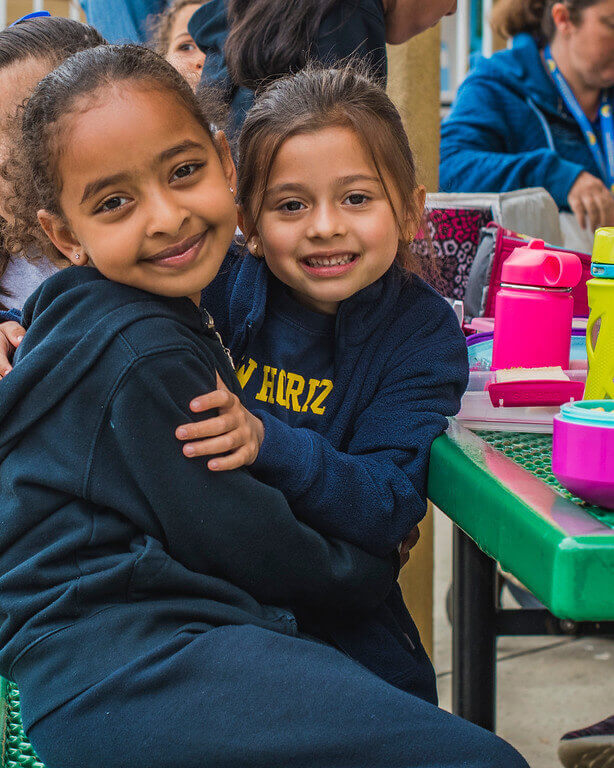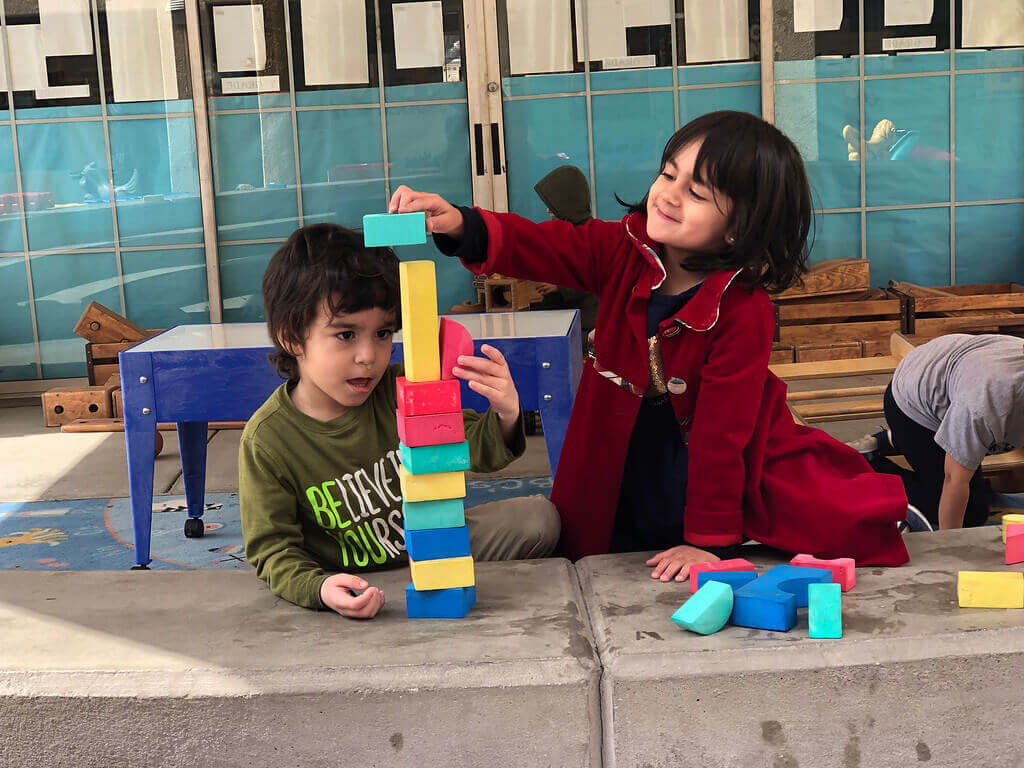FAQS
1. What academic standards do you follow?
See NHSP Curriculum Guide for more detailed information.
For English Language Arts (includes Reading and Writing) and Math, the school program uses the Common Core State Standards as a guideline. Resources for these subject areas are aligned to the CCSS.
According to the mission statement for Common Core, “The standards are designed to be robust and relevant to the real world, reflecting the knowledge and skills that our young people need for success in college and careers. With American students fully prepared for the future, our communities will be best positioned to compete successfully in the global economy.”
For Science, the school follows the Next Generation Science Standards (NGSS) for grades K-5 and the California State Standards Subject Standards for grades 6-8. For Social Studies and Physical Education, the school currently uses the California State Standards as a guideline.
Next Generation Science Standards
For Religious Studies (includes Qur’anic and Islamic Studies) as well as Arabic Language, the school follows the curriculum guidelines designed by the Bureau of Islamic and Arabic Education (BIAE). See NHSP Curriculum Guide.
2. What additional classes do you offer?
See NHSP Curriculum Guide for more detailed information.
Students enjoy a well-balanced educational program that provides inspiring and engaging learning opportunities.
The school employs specialists in the areas of art, music, outdoor learning, and physical education to provide regular classes to students from as early as preschool.
Technology classes are also offered to teach keyboarding, digital citizenship, cyber safety, Microsoft applications, and research skills. Often the learning is integrated with other subject areas.
In the middle school, seventh and eighth grade students have access to additional classes through the Electives Program. These include: Debate, Public Speaking, Geometry, Google Earth, Media Literacy, Robotics, Filmmaking, Acting, Guitar, Ceramics, Web Design, Coding, and Community Service.
Middle school students also take an 8-week course in Human Development using the Transitions program which is correlated with Islamic teachings and covers healthy living, physical and emotional development, and other topics appropriate to each age group.
These classes are taught by specialists in health and/or Islamic Studies and take place in single gender classes.
3. What is the average class size and teacher: student ratio for elementary? Middle school?
Our average class size is about 15-20 students. For Kindergarten, regardless of the size, there is a teacher and a teacher’s aide. For elementary grades, if the class size goes above 20 students, there is a teacher’s assistant assigned to the classroom.
4. What is the teacher ratio for the early childhood program?
For the early childhood program, the maximum teacher ratio is 1:12, and there are always two qualified teachers per class.
5. What is your philosophy for preschool?
Our school focuses on all aspects of a child’s development: social-emotional, cognitive, physical — fine motor and gross motor, and more. A child’s day is divided up with some structured learning opportunities and opportunities for free play which is key to a child’s overall development of their mind and spirit. In the early childhood program, the school emphasizes early literacy and has specific programs designed to enhance students’ reading readiness.
6. What types of technology do you offer in the school?
The school offers integrated technology throughout the school. In preschool and pre-Kindergarten, students have access to a technology center in their classrooms: iStart Smart. In Kindergarten through Grade 8, all classes are equipped with interactive SMART Boards, laptops, chromebooks, and iPads.
7. Do you have a Hafiz Program?
The school does not have a Hafiz program in which students memorize and recite the entire Qur’an.
Our approach to the Qur’an is to connect students to the book as a book of wisdom and a message from God, and, therefore, we believe it is important for them to understand the meaning of the Qur’an and not only memorize it. They do this through the English translation and through analyzing the Arabic using their Arabic skills.
We also believe that children need to memorize the Qur’an for the purpose of prayer and to enjoy the beauty of God’s message in its original form. So, we offer memorization, reading, and recitation opportunities in the curriculum. For a strong emphasis on reading and recitation skills, the school has adopted the Nuraniya program. Our teachers are all certified in teaching this program.
For families who wish to provide more training in this area, we offer an after-school program called Qur’anExcel.
8. What is your school’s API score?
New Horizon is a private, independent school and does not follow the public school system of rating schools with an Academic Performance Index. Actually, the State of California no longer uses API scores for school accountability; they now use a more holistic approach through the California School Dashboard which looks at graduation rate, suspension rate, English and math performance, school climate, parent engagement, and clean and safe buildings.
However, New Horizon utilizes various benchmarks to demonstrate the quality of the program and student growth. This includes achieving accreditation through two major accrediting organizations for private schools, California Association of Independent Schools (CAIS) and the Western Association of Schools and Colleges (WASC). The school is required to meet 112 different standards related to Teaching and Learning, Pedagogy, Climate and Culture, Student Experience, Health and Safety, etc. The school is reviewed every 3 years.
The school also earned the U.S. Department of Education’s Blue Ribbon award. This is earned based on test scores in the areas of reading and math which have to be in the top 10% in the nation. (Note: schools typically earn the Blue Ribbon title one time; they are actually restricted from applying from year to year).
The school’s high school matriculation list as well as overall performance results in reading and math are reported each year and demonstrate our students’ successful progress in academics and other areas.
9. Do the students go on field trips?
Yes, field trips offer excellent opportunities for students to enjoy expanded learning at various sites throughout Southern California.
For the early childhood program, field trips actually come to the school such as the reptile or bubble programs.
For elementary and middle school, we have selected specific day trips for each grade level that align with the curricular objectives. Some sites include: Aquarium of the Pacific, Getty Villa, Autry Museum, Jet Propulsion Laboratory (JPL), California Science Center, Natural History Museum, International Printing Museum, Riley’s Apple Farm (civil war program), Knott’s Berry Farm (physics program), Eaton Canyon Nature Center, Columbia Memorial Space Center, etc.
In middle school, the school offers an overnight Outdoor Education program. Students in grades 5 and 6 spend three days in the San Bernardino Mountains near Lake Arrowhead, learning science, survival skills, teambuilding, high ropes course, and more. In seventh grade, students take a 3-day trip to the Channel Islands off the cost of Ventura Harbor. Activities include setting up a campsite, cooking their own food, hiking, plant and wildlife study, kayaking, and spiritual reflection.
Eighth graders take a 4-day trip to Washington, D.C. as a culminating trip for their U.S. history program and as part of the New Horizon mission to nurture the students’ identity as Americans and good citizens. This educational program is run by the Close-Up Foundation in D.C. and includes visits to various memorials, Arlington Cemetery, and the Capitol. Students engage in a mock congressional debate with their cohorts from schools throughout the country.
10. What after-school classes do you offer?
The after-school program offerings may change from year to year. Here are the classes and clubs offered in the past year or two:
- For grades 1-4, students may sign up for: Super Soccer Stars, Musical Theater, Professor Egghead, and Qur’an Excel.
- For grades 5-8, students may sign up for: Garden Club, Debate Club, Engineering Club, Peer Tutoring, Sports Teams, and Farm-to-Table class.
11. How do you approach diversity in the Muslim community?
New Horizon has a very diverse school population. Although most students are predominantly Muslim, there is a range of practice and various expressions of Islam among our families. Thus, we strive to safeguard a climate of respect and understanding among students, parents, and staff. The school’s common goal is to raise children with a focus on God and Islam in their lives and the Qu’ran while also nurturing respect and appreciation for our differences within and outside of Islam.
12. What kind of leadership opportunities do you offer?
13. Where do students go after New Horizon?
Our students matriculate to a variety of different private and public high schools in Southern California. The school provides a high school counseling program to assist parents in the high school admissions and decision-making process. This includes one-to-one meetings with each family, a high school presentation on what to expect when applying to private schools, and high school visits from various private high schools in the area. The school currently has alumni who have attended or are attending the following private schools:
- Polytechnic School
- Flintridge Preparatory School
- Harvard-Westlake
- Buckley School
- St. Francis School
- Westridge School
- Mayfield Senior School
- Flintridge Sacred Heart Academy
- Alverno Heights Academy
- Ramona Convent School
- San Gabriel Mission School
- Don Bosco Tech
- Providence High School
- The Webb School
14. How much does it cost to attend New Horizon Pasadena?
The school charges a different annual tuition amount for each level at the school: early childhood, elementary, and middle school. There are no additional school fees.
Families have the option to pay the annual tuition in one or 11 payments starting in July each year.
The school also offers a Flexible Tuition program to assist families in being able to afford a New Horizon education. We do our best to work with every family.
15. What other tuition rates are available?
The school offers a Flexible Tuition program to assist families in affording a New Horizon education. This program requires an application to FAST, a confidential and easy online process at www.ismfast.com, and submission of tax returns. This process must be done along with the online admissions process. The school’s Flexible Tuition Committee reviews the applications through FAST and determines what tuition amount a family might qualify for.
All Flexible Tuition matters are handled by the Director of Finance and Operations, Berenice Hernandez. For any questions, please contact her at bhernandez@newhorizonschool.org or (626) 795-5186 Ext. 1131.
The admissions decision and the Flexible Tuition decision are sent to families on the same day.
16. Do you accept international students?
At this time, the school accepts applications from students from a foreign country who may be in the area on a temporary stay. This may be due to work-related travel or for graduate study. The school works with families who apply and have status through different visas, but the school, at this time, does not provide the I-20 visa to assist international students who may want to study from abroad in the United States.



